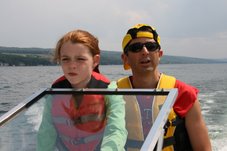The most recent School 2.0/21st Century Skills lessons were really a stretch that started me thinking differently, a little broader and a little more open-minded to the possibilities of applying technologies that our students are already using. To help refresh and challenge my thinking, I’m subscribing to some of the blogs/podcasts we’ve been introduced to during this course. I’d also like to continue connecting with this summer’s classmates using our blogs along with some study group/support group face-to-face contact.
As a result of this course, I’m changing the role of my classroom website so that it is more of a program overview and archive with links out to specific blogs and wikis. I’ve set up a blog for my Reach students’ parents and I to network. I’m wondering if it is also a place for students to join in on the conversations.
I plan to set up wikis or blogs for student-specific projects or units. I'm especially interested in a collaborative, Model T-style tech project with another class within or outside Hilton. I’ll need to work on setting up and using a wiki regularly to really get a handle on whether a wiki or blog is best for the materials, podcasts, links, student work, and newsletters/announcements that have been available on my classroom website.
Bill Rich quoted a teacher this morning, during the DI Institute keynote session, regarding change & learning. I thought of our journey in this online course. To paraphrase:
By not beginning we avoid progress.
By biting off too much we invite discouragement.
Begin where you can and chart a timeline of your progress.
The requirement to write in our blogs and post comments to each other created a timeline of our learning/change progress.
Overall, this online course has been an amazing eye-opener with practical applications, progressive thinking, and practice. Major kudos to Lori for creating a comprehensive course with the flexibility of web-based learning and the intensity of a graduate-level course. What a great value! Thanks!!


